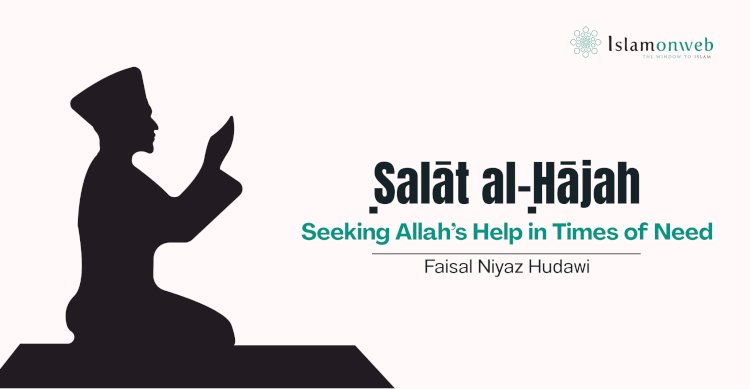Ṣalāt al-Ḥājah: Seeking Allah’s Help in Times of Need
Prayer (ṣalāh) is the intimate connection between the servant and his Lord, a noble act of worship that purifies the soul from the murkiness of anxiety and distress. In prayer, the believer stands before Allah, humbly calling upon Him to remove his burdens, for He alone has the power to lift sorrow, ease difficulties, and open paths where none seem to exist.
This was the way of the Prophet ﷺ. Hudhayfah ibn al-Yamān (raḍiya Allāhu ʿanhu) narrated:
“Whenever something concerned the Prophet ﷺ, he would pray.”
The wording “ḥazabahu amrun” means that if something troubled or saddened him, he would immediately turn to prayer — whether it was an obligatory or voluntary prayer, because it brought him tranquillity and served as his source of comfort. This practice is in perfect harmony with the Divine instruction:
{And seek help through patience and prayer} (Al-Baqarah 2:45).
Through this example, the Prophet ﷺ was teaching his Ummah the essence of tawakkul (reliance on Allah) and the importance of seeking Him in all matters.
Imām Mullā ʿAlī al-Qārī (raḥimahu Allāh) commented[1] that the Prophet’s act of praying at times of difficulty was both a means of facilitating the matter and an obedience to the Divine command in the verse {And seek help through patience and prayer}. He noted that this prayer could rightly be called Ṣalāt al-Ḥājāt (the Prayer of Needs), for it is not restricted to a particular manner or time.
Imām al-Manāwī (raḥimahu Allāh) explained[2] that prayer helps repel all calamities by turning the servant towards his Creator. Whoever turns fully to Allah in prayer will find that Allah protects him and suffices him, for the one who focuses entirely on the King of kings is guarded from all else.
Ibn Rajab (raḥimahu Allāh) also noted[3] that the Prophet ﷺ would stand for prayer when something troubled him because prayer is the true connection (ṣilah) with Allah, and he ﷺ said: “The coolness of my eyes has been placed in prayer.”
Shaykh ʿAbd al-Ḥaqq al-Dihlawī (raḥimahu Allāh) highlighted[4] that engaging in worship lifts sorrow from the heart because it unveils the reality of Divine Lordship. When that realisation settles in, worldly gains and losses become insignificant; the heart no longer grieves over what is lost nor rejoices excessively over what is gained. Others explained that when calamity strikes and the servant hastens to acts of devotion, it is as if he is saying to his Lord: “I offer You my worship, whether You grant me what I seek or test me with what I dislike.”
Imām al-Ṣanʿānī (raḥimahu Allāh) concluded[5] that this hadith is proof that prayer repels anxiety and grief, and that it is a cure for such ailments.
In light of this Prophetic example and the understanding of the scholars, the believer is encouraged to turn to prayer at the first sign of worry or hardship, for it is both an act of worship and a means of relief.
The Rulings and Method of Ṣalāt al-Ḥājah
Ṣalāt al-Ḥājah (the Prayer of Need) is a recommended (mustaḥabb) act of worship in which the servant humbly expresses his dependence upon Allah, acknowledging that he can never do without Him. Through it, he presents his request to Allah, hoping that the Most Merciful will grant it.
The majority of scholars hold that it consists of two rakʿāt, though some have mentioned four, and others twelve.
The primary narration describing its method is reported by ʿAbdullāh ibn Abī Awfā (raḍiya Allāhu ʿanhu) in Sunan al-Tirmidhī, Sunan Ibn Mājah, and others[6]:
“Whoever has a need from Allah, or from any one of the children of Ādam, let him perform ablution and do it well, then let him pray two rakʿāt. Then let him praise Allah and send blessings upon the Prophet ﷺ, and then say:
لاَ إِلَهَ إِلاَّ اللَّهُ الْحَلِيمُ الْكَرِيمُ سُبْحَانَ اللَّهِ رَبِّ الْعَرْشِ الْعَظِيمِ الْحَمْدُ لِلَّهِ رَبِّ الْعَالَمِينَ أَسْأَلُكَ مُوجِبَاتِ رَحْمَتِكَ وَعَزَائِمَ مَغْفِرَتِكَ وَالْغَنِيمَةَ مِنْ كُلِّ بِرٍّ وَالسَّلاَمَةَ مِنْ كُلِّ إِثْمٍ لاَ تَدَعْ لِي ذَنْبًا إِلاَّ غَفَرْتَهُ وَلاَ هَمًّا إِلاَّ فَرَّجْتَهُ وَلاَ حَاجَةً هِيَ لَكَ رِضًا إِلاَّ قَضَيْتَهَا يَا أَرْحَمَ الرَّاحِمِينَ "
Lā ilāha illallāh al-Ḥalīm al-Karīm, subḥān Allāh rabb al-ʿarsh al-ʿaẓīm, al-ḥamdu lillāhi rabb al-ʿālamīn, asʾaluka mujibāti raḥmatika, wa ʿazāʾima maghfiratika, wal-ghanimata min kulli birr, was-salāmata min kulli ithm, lā tadʿa lī dhanban illā ghafartahu, wa lā hamman illā farrajtahu, wa lā ḥājatan hiya laka riḍā illā qaḍaytahā yā arḥama-r-rāḥimīn.
[Ibn Mājah adds: “Then let him ask Allah for whatever he wishes of the matters of this world and the Hereafter, for He has the power to grant it.”]
The scholars have referred to this prayer, in this form, as Ṣalāt al-Ḥājah.
Scholarly Discussion on Authenticity
The hadith’s chain contains Fāʾid ibn ʿAbd al-Raḥmān al-Kūfī, who is considered matrūk (abandoned) by many hadith critics. Hence, some scholars, such as Ibn al-Jawzī, deemed the report unreliable and did not permit acting upon it.
However, other scholars allowed its practice for two main reasons:
- Supporting narrations – It has other routes and supporting reports (shawāhid) that strengthen it, and some considered Fāʾid’s narration acceptable for non-legal rulings.
- Its place in the category of faḍāʾil al-aʿmāl – In matters of virtuous deeds, it is permissible to act upon weak hadith if the act is already supported by general established principles and is not contradicted by something more authentic. This is the position of many jurists, including al-Nawawī, Ibn al-Ṣalāḥ, and others.
Imām al-Suyūṭī (raḥimahu Allāh) included[7] this hadith in his works on recommended prayers, noting its alignment with the general Qur’anic command to seek help through prayer. Ibn ʿĀbidīn (raḥimahu Allāh) also mentioned[8] that Ṣalāt al-Ḥājah falls under prayers of voluntary devotion that may be performed at any permissible time.
Summary of the Method
- Perform ablution (wuḍūʾ) properly.
- Pray two rakʿāt (according to the majority), though some have mentioned more.
- After prayer, praise Allah and send blessings upon the Prophet ﷺ.
- Recite the above supplication (duʿāʾ).
- Then ask Allah directly for one’s specific need, whether worldly or related to the Hereafter.
In this way, Ṣalāt al-Ḥājah serves both as an act of worship and a means of presenting one’s plea before the Lord of all worlds.Another
Prophetic Example: The Supplication of the Blind Man
A related narration is that of ʿUthmān ibn Ḥunayn (raḍiya Allāhu ʿanhu), recorded by al-Tirmidhī[9], who graded it ḥasan ṣaḥīḥ gharīb and also by Ibn Mājah[10], Ibn Khuzaymah in his Ṣaḥīḥ[11] and others.
It states that a blind man came to the Prophet ﷺ and said: “Pray to Allah to cure me.” The Prophet ﷺ replied: “If you wish, I will pray for you, and if you wish, you may be patient and that will be better for you.” The man said: “Pray for me.”
The Prophet ﷺ then instructed him:
“Go and perform ablution, doing it well, then pray two rakʿāt, and say:
" اللَّهُمَّ إِنِّي أَسْأَلُكَ وَأَتَوَجَّهُ إِلَيْكَ بِنَبِيِّكَ مُحَمَّدٍ نَبِيِّ الرَّحْمَةِ إِنِّي تَوَجَّهْتُ بِكَ إِلَى رَبِّي فِي حَاجَتِي هَذِهِ لِتُقْضَى لِي اللَّهُمَّ فَشَفِّعْهُ فِيَّ "
Allāhumma innī asʾaluka wa atawajjahu ilayka binabiyyika Muḥammadin nabiyyi al-raḥmah, innī tawajjahtu bika ilā rabbī fī ḥājatī hādhihi lituqḍā lī, Allāhumma fashaffiʿhu fiyya.”
The narration states that the man returned with his sight restored by Allah’s permission.
Later, ʿUthmān ibn Ḥunayf (raḍiya Allāhu ʿanhu) taught this very supplication to a man who had a need from the Caliph ʿUthmān ibn ʿAffān (raḍiya Allāhu ʿanhu). The man prayed two rakʿāt, recited the duʿāʾ mentioning his need, and Allah fulfilled it.
This narration, while distinct from the earlier hadith of Ibn Abī Awfā, shows the Prophetic instruction to combine wuḍūʾ, two rakʿāt, and a heartfelt duʿāʾ when presenting one’s request to Allah, reinforcing the principle and practice of Ṣalāt al-Ḥājah.
So after praying, one can supplicate to Allah using this dua as well, along with the previous dua. In sha Allah, it will be answered.
What to Expect After Ṣalāt al-Ḥājah and How to Respond
It is permissible to repeat Ṣalāt al-Ḥājah more than once, especially when the matter is important to the servant. However, when asking Allah for something, one should not rush the response or feel that it is being delayed unfairly. What you ask for may be fulfilled within a week, or it may take longer, perhaps much longer. The believer’s role is to fear Allah, place complete trust in Him, and continue turning to Him in supplication.
A delayed response does not necessarily mean that one’s connection to Allah is weak. Sometimes Allah grants a request immediately, and at other times He delays it for reasons known to Him alone, such as increasing the servant’s persistence in duʿāʾ or granting something better at a more suitable time. The commentators mention, regarding Allah’s words to Mūsā and Hārūn (ʿalayhimā al-salām):
“Your supplication has been answered” (Yūnus 10:89),
that the fulfilment of this particular request came after forty years[12].
The Prophet ﷺ said:
“Duʿāʾ is worship.”[13]
(Narrated by al-Tirmidhī)
He ﷺ also said:
“No Muslim offers a supplication in which there is no sin and no severing of family ties except that Allah grants him one of three: either He grants his request quickly, or He stores it for him in the Hereafter, or He diverts from him an equivalent harm.”
They said: “Then we will make many duʿāʾs.” He said: “Allah has more to give.”
(Narrated by Aḥmad)[14]
In another hadith, he ﷺ warned against impatience:
“A servant will continue to have his supplication answered as long as he does not ask for sin or severing of family ties, and as long as he is not hasty.”
It was asked: “What is hastiness?” He said: “He says: ‘I have prayed and prayed, yet I do not see that I have been answered.’ So he becomes disheartened and stops making duʿāʾ.”
(Narrated by Muslim)[15]
Therefore, after praying Ṣalāt al-Ḥājah:
- Maintain trust in Allah’s wisdom. He knows the right time and the best form for your request to be granted.
- Persist in prayer and duʿā. The act itself is a form of worship that draws you closer to Him.
- Do not lose hope, even if the response takes years, the time is never wasted; every supplication is recorded and rewarded.
- Be open to different forms of acceptance. Allah may fulfil your request, avert harm, or reserve something far greater for you in the Hereafter.
The believer’s heart should rest in the certainty that Allah’s promise is true, His decree is wise, and His mercy is vast, and that no sincere prayer goes unanswered in the sight of the Lord of the worlds.
References:
[1] Mullā ʿAlī al-Qārī, Mirqāt al-Mafātīḥ Sharḥ Mishkāt al-Maṣābīḥ, vol. 3, p. 990.
[2] Al-Manāwī, ʿAbd al-Raʾūf, Fayḍ al-Qadīr Sharḥ al-Jāmiʿ al-Ṣaghīr, vol. 5, p. 120.
[3] Ibn Rajab al-Ḥanbalī, al-Ḥikam al-Jadīrah bi-l-Iʿdhāʿah, p. 21
[4] ʿAbd al-Ḥaqq al-Dihlawī, Lamʿāt al-Tanqīḥ Sharḥ Mishkāt al-Maṣābīḥ, vol. 3, p. 435.
[5] Al-Ṣanʿānī, al-Taḥbīr li-Īḍāḥ Maʿānī al-Taysīr, vol. 5, p. 20.
[6] Al-Tirmidhī, Sunan al-Tirmidhī, Kitāb al-Ṣalāh, ḥadīth no. 479, Ibn Mājah, Sunan Ibn Mājah, Kitāb Iqāmat al-Ṣalāh, ḥadīth no. 1384, Al-Nasāʾī, Sunan al-Nasāʾī al-Kubrā, vol. 6, p. 168, Ibn Khuzaymah, Ṣaḥīḥ Ibn Khuzaymah, vol. 2, p. 222
[7] Al-Suyūṭī, al-Ḥāwī lil-Fatāwī, vol. 2, p. 268 (discussion on Ṣalāt al-Ḥājah).
[8] Ibn ʿĀbidīn, Radd al-Muḥtār ʿalā al-Durr al-Mukhtār, vol. 2, p. 28
[9] Al-Tirmidhī, Sunan al-Tirmidhī, Kitāb al-Daʿawāt, ḥadīth no. 3578.
[10] Ibn Mājah, Sunan Ibn Mājah, Kitāb Iqāmat al-Ṣalāh, ḥadīth no. 1385.
[11] Ibn Khuzaymah, Ṣaḥīḥ Ibn Khuzaymah, vol. 2, p. 225
[12] Al-Ṭabarī, Jāmiʿ al-Bayān, commentary on Yūnus 10:89 (delay in fulfilment of Mūsā’s duʿāʾ).
[13] Al-Tirmidhī, Sunan al-Tirmidhī, Kitāb al-Daʿawāt, ḥadīth no. 2969 (al-duʿāʾ huwa al-ʿibādah).
[14] Aḥmad ibn Ḥanbal, Musnad Aḥmad, ḥadīth no. 10749
[15] Muslim ibn al-Ḥajjāj, Ṣaḥīḥ Muslim, Kitāb al-Dhikr wa-l-Duʿāʾ, ḥadīth no. 2735
Disclaimer
The views expressed in this article are the author’s own and do not necessarily mirror Islamonweb’s editorial stance.






















Leave A Comment